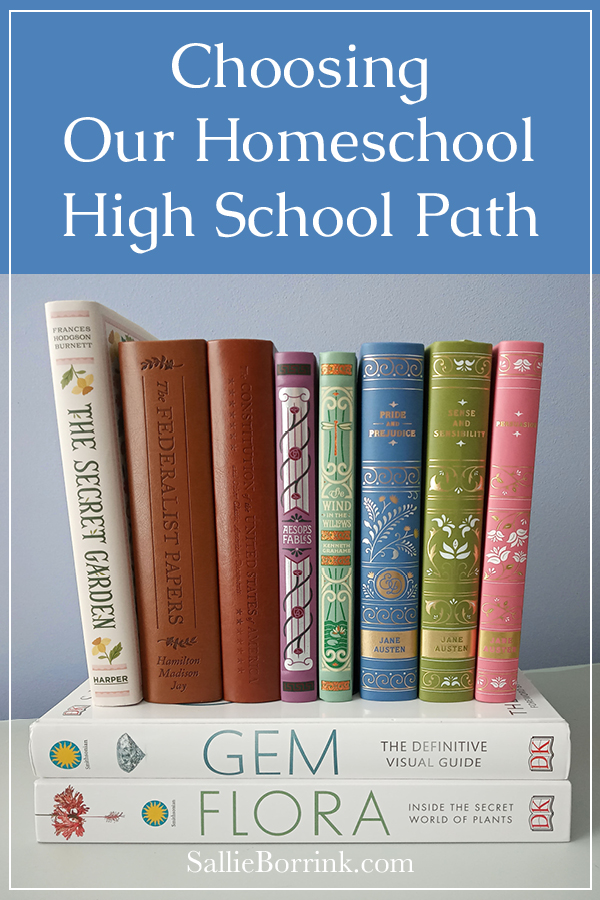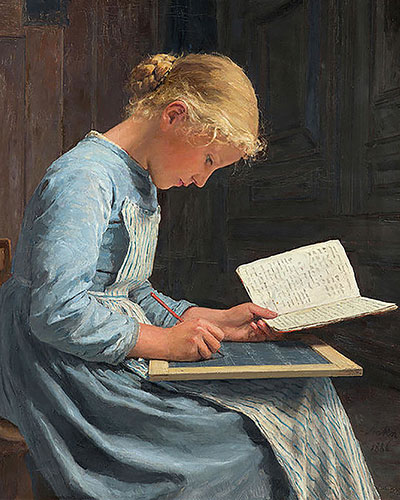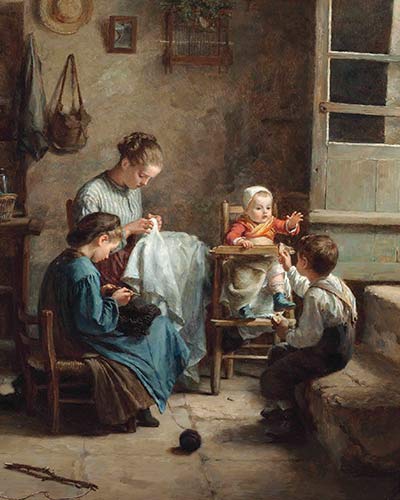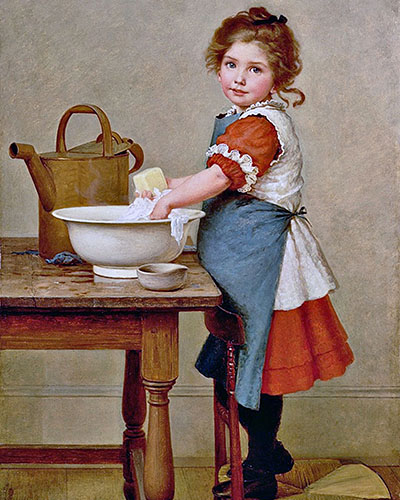To say I’ve been in a little bit of an existential crisis regarding our homeschooling choices for high school would be somewhat accurate. A reader wrote and asked if I had written about our high school choices because she couldn’t find anything.
That’s because there isn’t anything yet about our plans.
We are “officially” wrapping up what most people would call “last year” during this month of August. We will start “this year” after Labor Day. That is three weeks away. I’ve been praying and reading, asking God to show me clearly what to do with Caroline’s high school education. (If you are a newer reader, I’ve written extensively about the fact that she’s artistic and creative. She’s 2e meaning she is both gifted and has a few learning differences. Just check the blog categories and resource pages. You’ll find lots of back story.) We live in Michigan so the guidelines are very generous. There are no set requirements other than providing a well-rounded education.
At this point, Caroline is not interested in going the four year college route. She talks about perhaps trying community college or online college, but has zero desire to go away from home and live in a dorm. Dorm life, to her, sounds a lot like hell on earth. She is a homebody who enjoys brief excursions into the outside world and then is happy to be home, doing her own thing again in peace and quiet. She would like her own home and family. She has ZERO interest in a 9-5 cubicle job, something she has said many times in recent years. Of all the things she’s expressed about her future, this one has been loud and clear. LOL!
Choosing a Homeschool High School Approach
So I picked up Curious Unschoolers again because even though we are Relaxed Homeschoolers, I find Sue’s thoughts helpful. (See here for first time.) I’ve been re-reading bloggers who have most inspired me in the past. And praying. A lot of praying. I’ve been waiting for those aha! moments that God usually brings when everything finally comes together in my head. (Even this post is a bit of thinking out loud while I’m writing it.)
I ended up back on Heather’s blog and re-read the last few posts she wrote about her homeschooling experience with her only child (a daughter). I remember reading This May Take Awhile in real time when she wrote it and it has always stuck with me. This time, however, different things jumped out at me (bolded below) because I’m in a very different place on this journey than I was five years ago when she originally wrote it.
One of the greatest benefits to homeschooling is the time it affords a young person to go deep with an area of study or skill. Our days are spacious and parameters are loose. To the average onlooker this can appear imbalanced, that perhaps the student is lacking in certain areas while greater emphasis is placed on another. To the fortunate student, it is clear that balance is an impossible achievement no matter what model of education you follow, and that to do anything one way means you must give up doing something another way. What is discovered however, is that learning without boundaries actually brings entire diverse bodies of knowledge and skill closer because “learning” and “education” do not lose their beauty or luster under the guise of something we must get through. Learning is coveted and continuously sought after, usually without us even realizing it. Humans are curious beings and when a new idea or topic enters the psyche, we naturally want to explore it. When intrinsically motivated, learning is not an obligation or an item on our to do list, instead it feels worthy of our attention, even if challenges and hard work present themselves along the way.
Competitive debate has been Emily’s “thing” over the last four years. With a healthy degree of confidence I can say that debate has influenced the trajectory of her life, thus far, more than anything else she has done or been exposed to. No, she has probably not dissected the number of animals the average public high schooler has dissected, but is that really necessary? Is the average public high schooler able to skillfully stand before a full auditorium and argue the ethics of assisted suicide, or, whether it is in Iran’s interest to develop a nuclear bomb, and is it really necessary for them to do so?
Sometimes I think people view our homeschool story as an example of “success” because Emily has naturally gravitated toward academics and that feels safe to many of us. To me, that is a limiting mindset and one that I would discourage. Because believe me, standing here on the cusp of our final homeschool days, I do wonder if there was some way I could have convinced her to fall in love with preparing meals… or growing food… or sewing clothes… or… or… or. She can do all of those things, and she will help whenever needed, but these are not areas of interest that she initiates or takes ownership in. Don’t we all have things we’re just not into? I know my list is pretty long.
The Two Options I’m Contemplating
I’ve gone back and forth on the two main options before me.
- Go the “something we must get through” route by ordering textbooks, video courses, and workbooks. Do the work and check the box each day on the subjects we “must” or “should” do.
- Spend the next four years investing my time in crafting an individualized education that fits who we are as a family and who God created Caroline to be as a person.
There are benefits to both. Truly.
- If we go the box-checking route, we can pull out the book (or video course) each day and read it out loud (or watch it) together. Do the exercises. Done. We’ve completed our obligation and can spend our time doing the other stuff we want to do. Almost no preparation time for me. We can discuss rabbit trails and such, but this is by far the easiest route for both of us. There is no prep for me and everything is organized for me. And easy is not necessarily wrong or the lesser choice if it meets our needs.
- Or I can invest a lot of time the next four years crafting a really lovely education for her that integrates the things we are most interested in. It will be a significant time investment because we “do” our homeschooling work together. Due to her processing issues and such, we read aloud to each other, watch videos, etc.
No matter which path I choose, I will be spending hours every day doing school with Caroline on top of whatever it takes me to prepare each day. If I go with choice two, homeschool will become close to a full-time job for me for a few different reasons.
One of the things Daniel Franklin talks about in Helping Your Child with Language-Based Learning Disabilities is that you will need to be supporting and working alongside your child through high school and even into college in many cases. (See my post: Homeschooling a Child with Language Based Learning Disabilities.) He also discusses the importance of parent proximity to facilitate student concentration, something I’d like to address in another post. But, yes, homeschooling high school is going to be very hands-on and active involvement for me no matter what we do because I have to literally be there most of the time. While most homeschoolers find in high school they can give their child more and more independent work, that will not be our experience. Think about how much independent reading a typical high schooler does and imagine doing almost all of that aloud. We’re going to have to carefully choose what we do to make sure it counts for more than one subject at a time. My voice won’t last for hours a day. (Before someone asks, audio books seem to be a no-go for her.)
Some might say there is the option of trying to do a bit of both and I’ll address that as well.
Creating an Individualized High School Education
When I think about hand-crafting her education, these are the core subjects that shape my thoughts:
- Bible & Theology
- History
- Literature
- Music
- Art
- Government
- Economics & Financial
- Home Economics
It is very natural to integrate these and we do that basically as a way of life. Our family conversations revolve around these topics all the time. I would simply need to organize it and make sure I can justify giving her a high school diploma at the end. I also struggle with the idea of making sure we do enough so if she changes her mind in a year or two (or three) and wants to go to college, we aren’t scrambling at the last minute to make sure she can go.
To be honest, if I knew college was completely off the table this would all be so much easier. If you know college is the goal, then you do the college prep thing. But if college isn’t the goal, then I definitely would not waste her time on demanding soul-sucking subjects (for her) that will have no real purpose for her in life.
You’ll notice writing is not on there. A foreign language is not on there. The writing will be integrated with other subjects. The foreign language? I’m not sure. I really do not want to overwhelm her. We’ve started and stopped French a few times. It seems it was never the right time yet.
Our approach to science is going to be more of a understanding of science, the history of science, and how science impacts our world as opposed to lots of labs and math (due to the dyscalculia). I do not care if my child dissects anything (and she does not want to). I don’t even really care if she doesn’t do chemistry experiments. We can watch videos of them and that’s good enough for me. Neither one of us is interested in investing significant time on the hard sciences in the way you would experience them in a typical college prep high school environment.
That isn’t to say we don’t like science. We all love it and talk about science things all the time. Last night in the car Caroline was telling us about the colors of sunsets on the various planets. I have no idea where she learned this, but she’s always teaching herself something in the realm of science. She’s naturally curious. But I’d like our science to fit in with the rest of our subjects rather than being an intensive, stand-alone subject.
One option I’m considering is doing a science class like this one at Compass Classroom.
We wouldn’t do that until next year, but that would be the kind of video and textbook class I would be inclined to use if we go with a combination of the two approaches. I also have the materials I received for the post I wrote Physics & Chemistry for Learners Who Struggle with Math. Those materials could also work.
Math is going to be intensely practical due to the dyscalculia.
Then we have electives to figure out. She’s very interested in doing a Psychology class. Whatever the electives are, I need to try to weave them in with the other class topics.
See? This is where I will need to be investing a lot of time if we go the personalized route. Whatever we do, I have to get a lot of bang for our buck for every minute we do our learning together. I’d like most things to count twice (literature and history, history and English, etc.) because there aren’t enough stretches of concentration throughout the day to spend an hour on every subject and elective. We already have to break up our learning into at least four different sessions spread apart during the afternoon and evening.
So that’s what I’m thinking about right now regarding high school. Once I pull together what we are going to do, I’ll probably share more details at some point.
Read more: My posts in Homeschooling High School include many curriculum reviews and introductions.
Photo is of books from my recent book binge at Barnes & Noble. They will all be used for high school or fun.

















 Morning Hope – Psalm 35:4-10, 17-28
Morning Hope – Psalm 35:4-10, 17-28
You may want to check out The Good and the Beautiful. I believe they are currently offering the first year or two of high school. This curriculum runs from K-early high school while they work on the next years. Currently using this for kindergarten. It is truly good and beautiful. Visually stunning with so much good literature. It is easy, open and go for the most part. I hope this helps.
Thank You for this informative post. It is hard to believe Caroline is entering High School. God Bless.
Joan,Marion and Marilyn